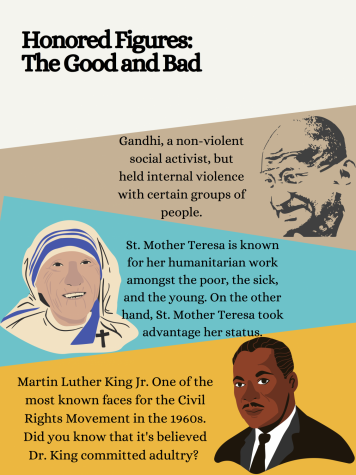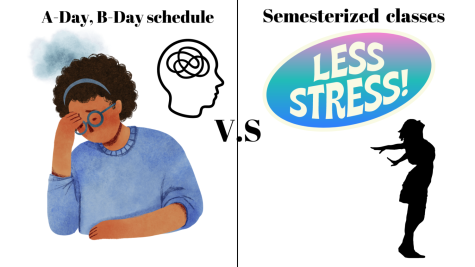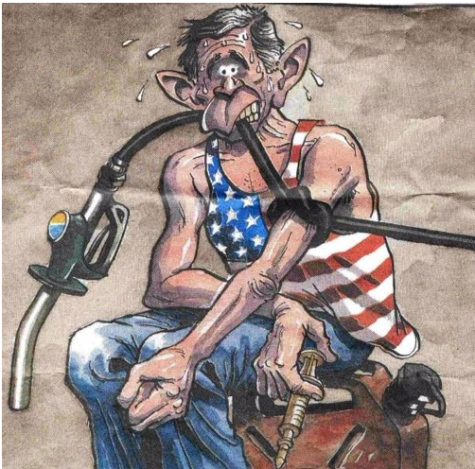Glorification of religious historical figures: The Good and The Bad
They say, “whatever is in the dark will come to light”. In other words, whatever secrets, dark truths, or hidden thoughts are kept in a vault will eventually be open to the public. Of course this is not hundred percent the case for every person, but what if the topic of this conversation involved beloved and notable people of religious and political history? What unexplored chapter of a notable person’s life may have ruffled some feathers? Should all the praise for these people go down the drain now?
Mahatma Gandhi
Born on October 2, 1862, Indian leader, Mahatma Gandhi is known for being a social activist who played a significant role in nonviolent movements in order to free India from the clutches of British rule. So, Gandhi aided India in gaining their independence. Some may find this information to be a highlight of Gandhi’s character. With every highlight, there’s a shadow. Let’s take a look at those shadows.
According NPR, while Gandhi was a nonviolent person, he did possess internal violence with a certain group of people. NPR states, “Sure, he was non-violent, but the internal violence against Black people was eventually discovered.” Diving deep on the topic of race, Gandhi believed that black people were dirty and troublesome people who lived like animals. It doesn’t take a genius to categorize Gandhi’s beliefs as racist and stereotypical.
Now this raises the question. Why is the education system not teaching or informing students about these controversial accusations, but are instead bringing up the good side of these figures out of history books? Is it even our business? But as far as the education system in the U.S, The Atlantic argues, “…the historiographical approach avoids pursuing truth for the sake of satisfying a national myth,” and “American exceptionalism, a term that “often risks masking the horrors of America’s past with its greatest triumphs” hints at this risk. So, most history lessons would rather cover up the horrors and mistakes, and instead spotlight the victories and positivity dealing with specific events and people.
Junior Alexis Tapia expresses, “I think when it comes to learning about historical figures such as Gandhi, it is very important for us to know the full story behind these figures.”
 Mother Teresa
Mother Teresa
Mother Teresa shouldn’t be a mystery in the Catholic and Christian community, as she is a Saint, canonized on September 4, 2016. Not sure if many Christians, who love St. Mother Teresa have heard but the media has dispersed and recovered information in regards to Mother Teresa behaving in a not-so saint-like manner on multiple occasions.
In one instance during her 517 missions around the world, Saint Mother Teresa was called out by doctors who reported conditions of unhygienic and improper care for people under the catholic church”, according to Huffington Post.
The Huffington Post expressed that Mother Teresa once believed that people suffering was not a bad thing. In fact, Mother Teresa once said, “There is something beautiful in seeing the poor accept their lot, to suffer it like Christ’s Passion. The world gains much from their suffering.”
“When I hear people talk about Mother Teresa, they usually talk about how helpful she was with all of her humanitarian work,” said junior Asma Amsa. This is true. St. Mother Teresa was a humanitarian. Taking care of sick patients in hospitals and caring for the poor. So, this brings up the question. Has the time taken up by taking care of other people, being loved by a lot of people, consciously directed Mother Teresa to be shady, thinking she’d get away with whatever?
Separating humanitarian acts from St. Mother Teresa, it’s also been discovered that she hung around dictators. Involved with politics, but viewed as “politically naive” by Foreign Policy.
Martin Luther King Jr.
It might be a surprise, for some people, that Dr. King Jr. was not a perfect human being contrary to what people are told in history books. Dr. King Jr. was one, if not the most, influential person involved with the Civil Rights Movement in the 1960s. Believing that no one should be judged based on the color of their skin, but rather the content of their character.
What has Dr. King done to fracture his image in some people’s eyes? Well, the Vail Daily enunciated that King committed adultery, meaning he cheated on his wife. However, these are just rumors. Obviously it hasn’t deteriorated his image as he is still known and “praised” by many individuals, especially African Americans, for his acts and beliefs in the 1960s that still impacts today. We even have a day after him, Martin Luther King Jr. Day on January 17th.
Now What?
With all of these accusations and facts being revealed and acknowledged by the public, is it still relevant? All of these three figures have perished, is it even any of our business? Many may argue ‘No’, but some may believe that it is important to spotlight the idea that we all are human and we make mistakes and idiotic choices.
Amsa argues, “I believe public figures, historical, religious, or in other fields should be held accountable for their past wrongdoings even after they’ve passed,” Amsa argues. “Of course, no human is perfect, however, with a certain level of recognition comes responsibility.”
In the 21st century, “worshiping” or “idolizing” is as common as it was in the 16th or 17th century. There have been kings, queens, preachers, musicians, etc. People that are held on some sort of pedestal are normally spectated as individuals that can do no wrong.
Big Think argues that praising fellow humans has its cons. The article states, “The effects of excessive praise on conduct are also worth concern. Praising people, even those who deserve praise, can actually have a negative effect on their behaviour.”
Some of the negative outcomes involve: entitlement, ignorance, and even stuck up demeanors. Again, “praising people excessively can lead them to act badly.”
Like Big Think, Tapia also voices, “Over praising people can lead to individuals ignoring the wrongdoings that have been committed by those praised.”
They say, “too much of anything is bad” and this applies in these scenarios. Mother Teresa, Gandhi, and Martin Luther King Jr. are just some public figures that have had their past and personal lives infiltrated. There are more devious people out there. Remember, calling out ignorance and entitlement can reinforce good behavior.
Your donation will support the student journalists of Parkdale High School. Your contribution will allow us to cover our annual website hosting costs and publish some printed editions, as well.

Ineza is a junior that has been on staff for at least 2 years. She brings versatility to the school's paper, writing about different topics, capable of...











